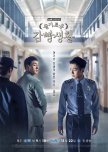

Resident Playbook and Prison Playbook, both by the Reply series team (Lee Woo-jung/Shin Won-ho), share striking similarities despite different settings. Each follows a tight-knit group of men navigating a rigid, hierarchical system (hospital residency/prison), blending dark comedy with raw emotional struggles.
Both critique systemic flaws (healthcare bureaucracy/justice corruption) while humanizing their flawed protagonists—talented but imperfect figures who grow through mentorship and camaraderie. Their episodic, slice-of-life storytelling balances humor and heartbreak, emphasizing small victories over grand plots.
While Resident Playbook is faster-paced with medical crises, Prison Playbook leans reflective, but both excel in realism, moral gray areas, and ensemble chemistry.
Both critique systemic flaws (healthcare bureaucracy/justice corruption) while humanizing their flawed protagonists—talented but imperfect figures who grow through mentorship and camaraderie. Their episodic, slice-of-life storytelling balances humor and heartbreak, emphasizing small victories over grand plots.
While Resident Playbook is faster-paced with medical crises, Prison Playbook leans reflective, but both excel in realism, moral gray areas, and ensemble chemistry.


Korean emperor Lee Gon tries to close the doors to a parallel world which was opened by demons; a detective tries to protect the people and the one she loves.


The male lead (police) in Life on Mars also gets transported back to the past (1988) to solve a serial murder case.


